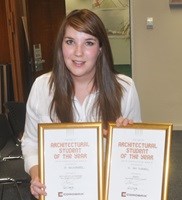NMMU winner of architectural competition announced

Simon Steward and Simon de Vries were awarded second prize, while Yusha Ebrahim and Theodor de Goede shared third prize.
Christie van Niekerk of Corobrik presented prizes to the winning students. "These annual awards aim to promote and reward design excellence amongst students whilst encouraging a broadening in understanding of the environmental issues and their resolution.
Through discourse around thesis projects design paradigms are inevitably challenged and new design ideas evolve, giving depth to architectural resolution while building technical skills sets required by architects of the future."
Platform for trade
Van Niekerk's thesis is entitled 'A platform for trade and interaction'. The platform comprises an essential oil distillation plant, an informal market and a cattle trading area for the Ovahimba people of Opuwo in Namibia. This cultural group is made up of traditional nomadic pastoralists who move in search of good grazing land and water to take care of their cattle. Discovering an abundance of underground water and fountains at Opuwo influenced their nomadic lifestyle and more permanent settlements have been created.
Opuwo is a meeting place where the Ovahimba nomads, tourists and local people come together to trade and interact forming a rich node of energy in the very harsh climatic environment of the Kaokoveld. The dynamism of Opuwo is produced by tourists travelling to the Kunene River, surrounding Ovahimba settlement groups coming to Opuwo for the necessary resources and facilities, Ovahimba men travelling hundreds of kilometres for cattle trading and traditional Himba harvesters coming to sell their Commiphora Wildii resin and Mopane seed gatherings.
The design proposal was fuelled by these energy sources in order to create a new town centre with an essential oil processing plant as the catalyst project.
Thick walls
In her award for best use of clay brick Van Niekerk says incorporated thick mass walls of clay bricks were used to create a protective skin in the same way the red earth mixture protects the Ovahimba people from the harsh climatic conditions in Opuwo. The entire design proposal was dressed in ochre colour bricks which bind the architecture to the immediate context and created a cool and comfortable internal working environment.
The national winner, to be chosen from the eight regional winners, will be announced and presented with a cheque for R50,000 at the National Student Architect awards function in Johannesburg in on 9 April 2014.






















